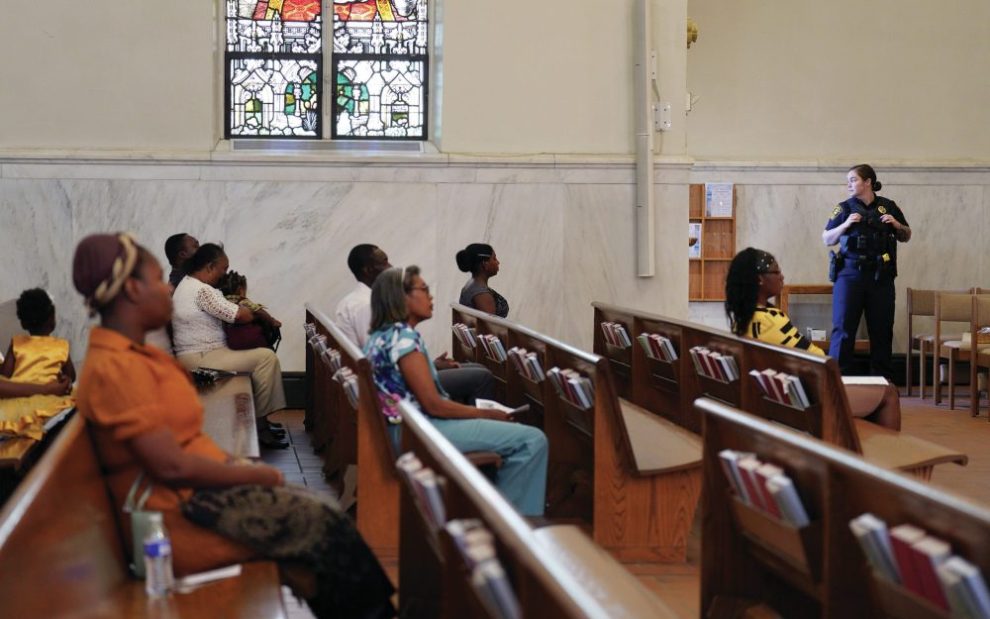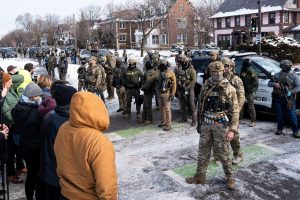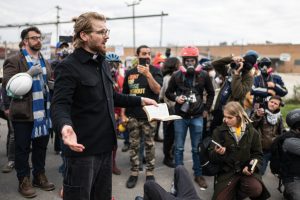Haitian refugee Patrick Joseph comes from a country where tropical flowers bloom in a cavalcade of colors. He now lives in Springfield, Ohio, where the dreary winters create a dull gray landscape as the brown earth lies dormant. Nevertheless, Joseph, 50, doesn’t mind the Ohio winter. He sees Springfield, a quintessential American Rust Belt town, as being next door to heaven.
In the past, Haitian immigrants to the United States have largely gravitated to South Florida and Brooklyn, New York, settling in well-established communities. But about five years ago, some Haitians—like Joseph—started settling in Springfield, an Ohio manufacturing city that had experienced a resurgence of job opportunities. Joseph came to Springfield four years ago and found work at the downtown St. Vincent de Paul Store, where his bilingual abilities in English and Creole are an asset.
He regularly attends the Creole Mass at St. Raphael’s Church, and he often invokes God in his conversations. “He heard my prayers,” says Joseph, who landed in Springfield after he heard there were jobs to be had in the factories and warehouses that line U.S. Route 40, the old road that parallels the interstate between Springfield and Columbus. When he arrived, Joseph lived in a house with more than a dozen other Haitians, all sharing two bedrooms.
In Haiti, Joseph had run a small business and played music at bars. But he needed to leave. In his native country, he regularly woke up to bodies left on the streets, killed by roving gangs who operate with impunity in a country where the government barely functions. Haiti suffers from a long legacy of colonization, slavery, environmental degradation, and corruption.
But Joseph doesn’t expound on that. He is happy in Springfield and would like to stay. He acknowledges that he misses his family, but when curious Americans ask him why he lives in Springfield, he suggests they Google Haiti to get a sense of the danger that drove him to leave. Today, he has found a second family at church. Besides his work with St. Vincent de Paul, he also has a factory job.
But Springfield’s Haitian community is facing a crisis. The Creole Mass at St. Raphael’s is dwindling as congregants cope with the fear of deportation. Many Haitians keep a low profile, and some have left town.
Not Joseph, though. “Going back to Haiti is not an option,” he says.
A symbol of America divided
The small city of Springfield, with a population of about 60,000, has become a symbol of an America torn between the ideals of the Statue of Liberty and the anti-immigrant culture fostered by the current administration. So far, the latter appears to be winning.
Much of the turmoil began during the 2024 presidential election, in which the Springfield Haitian community played an unlikely but prominent role. “They are eating the cats,” said President Donald Trump during last year’s presidential debate. The result of his comment was palpable fear for immigrants praying at St. Raphael’s church.
Trump’s running mate, JD Vance; Elon Musk; and some prominent Ohio Republicans had already spread the false rumors even before Trump’s statement. It apparently originated in August 2024, when a neo-Nazi group claimed Springfield’s Haitian residents were stealing townspeople’s pets and eating the ducks in city parks.
Vance later acknowledged that the rumor wasn’t true. But still, he argued, perhaps the rumor pointed to a larger truth: Some 10,000 to 15,000 Haitians came to Springfield over the last five years, competing for jobs and housing, and Vance claimed that the majority population didn’t want them. Meanwhile, most Haitians are legally in the country and gainfully employed.
In a world where online rumors and misinformation abound, the truth is often hard to see. Some people grasped Trump’s accusations as justification for their own racism. Two days after the presidential debate in 2024, Springfield’s City Hall closed due to bomb threats. In the days that followed, at least 33 bomb threats caused evacuations at city hospitals, schools, homes, and businesses.
Some Springfield community members also agreed with Vance’s claim that the influx of refugees was a threat to their city. The flood of new residents had boosted housing costs, overcrowded schools, and strained medical services. People said the Haitians in their community were a threat to public safety, referring to a 2023 incident when a Haitian immigrant was involved in a motor vehicle accident that killed a child.
“Help, not hate”
Recognizing the role Haitian refugees have played in the city’s healthy growth, Springfield Mayor Rob Rue and Ohio Governor Mike DeWine, both Republicans, affirm the benefits of the Haitian community. In August this year, DeWine told reporters that Ohio is bracing for the negative effects of losing thousands of workers if Trump’s administration succeeds in deporting Haitian immigrants. “It’s not going to be good,” DeWine says. Employers, as well as the state’s entire economy, will be left reeling. Rue agrees; in a recent interview with Reuters, he said the influx of Haitian immigrants “could absolutely have a long-term benefit.”
He acknowledges, however, that the city is “in a rocky season” while it tries to catch up with the new strain on city services caused by the sudden population jump. He told the Springfield News-Sun that the city was unprepared and could have benefited from more careful federal planning. But, Rue indicated, the city needs government help, not hate.
The response from Springfield residents indicates this complexity: Even while the added stress on the city’s services is a difficult reality, many residents still support the refugee community. Even the parents of the child killed in the accident involving a Haitian driver publicly demanded that the tragedy not be used as a political weapon against immigrants. Local employers praise refugees’ skills and commitment to their jobs, and in July this year, a coalition of churches, clergy, and faith-based Springfield organizations celebrated the contributions of Haitian immigrants to their community. Since then, more than a hundred community leaders have formed an immigrant advocacy group, preparing to legally defend deportees and provide them refuge.
The City of Springfield makes this statement on its website: “Immigrants are working in Springfield—in various industries that are in great need of workers.” It lists the many vital ways Haitian immigrants contribute to the city’s economy. The city’s Chamber of Commerce says Springfield’s recent economic growth is in part due to the Haitians, who fill much-needed work positions, start their own businesses, and spend their money at local stores and restaurants.
But in Springfield, the lies and rumors still echo in the city’s quiet streets.
Living in trepidation
Father Fritz Valcin, the Haitian-born priest who ministers to the Haitian Catholic community at St. Raphael’s, notes that some Haitians in the church are leaving the area. Many who remain are fearful.
An Associated Press photo from September of last year shows St. Raphael’s parishioners, Black and Haitian, on their knees at Sunday Mass. A police officer stands next to the pews, warily looking out for potential trouble. The officer was there because of a lie, repeated so often and by so many powerful people that it took on the ring of truth.
“With the election of the new president, a lot of people stopped going to church,” says Valcin. He serves as a pastor in the Diocese of Columbus and commutes 75 miles each way every Sunday to minister to Haitian Catholics in Springfield. Last year, before the election fracas, the Springfield Sunday Mass for Haitians attracted about 150 congregants. Now the parish is lucky to gather 50. “A lot of parents with kids don’t go to Mass out of fear,” says Valcin.
Their fear isn’t unreasonable. The Trump administration declared soon after taking office that churches and schools could no longer be considered safe spaces; Immigration and Customs Enforcement (ICE) could now make arrests in worship sites and schools.
Today, tensions still simmer. Those Haitians who remain are aware that the Trump administration plans to take away their Temporary Protected Status (TPS). Many of the Haitians in Springfield fall under that status; they are, for now, able to work legally but not for long.
Back in April of this year, about 40 worried Haitian refugees arrived at the St. Vincent de Paul Society after receiving an email from federal immigration declaring they had three days to return to Haiti. Immigration advocates advised them to stay put for now. Then, on May 30, the U.S. Supreme Court allowed the Trump administration to begin deporting some 500,000 migrants, including Haitians—but on July 15, a New York federal judge blocked the administration’s efforts to take away Haitian immigrants’ legal protections. For now, they have their protected status until February 3, 2026. Meanwhile, the administration has stated its intention to fight the court ruling.
Catholic solidarity
Local Catholics’ reactions have been marked by support for the refugees, mixed with caution. After the debate fracas last year, Archbishop Dennis Schnurr, who retired as Cincinnati’s archbishop in April, said he hoped Catholics would place the plight of the Haitians above politics—but he did not mention the politicians who were denigrating the Haitians.
He showed his support with a visit to the Haitian congregation on their national independence day, January 1. “The church supports you and welcomes you amidst these trials,” Schnurr said at the Independence Day celebration. “We hope that all of you, seeking asylum in this country, can find in the Catholic Church a home away from home. We want to help you in any way that we can.”
In a press release last year, Schnurr also said:
The Church provides an opportunity for us to leave behind political agendas and offer the goodness of basic human interactions inspired by the faith and charity which come from God. Any of the thousands of volunteers and supporters who help make our humanitarian work possible can attest to the great gift this has provided for their own faith journeys and our communities. Working with migrants and refugees is a wonderful way to put our Catholic faith into action, just as is serving any other person in need.
Other bishops have also supported the Haitian immigrants, arguing against the elimination of their refugee status. For example, Archbishop Thomas Wenski of Miami, a church leader with personal experience ministering to Haitians, decries the threat to refugee status, saying, “Basically Haiti is a house on fire, and you can’t push people back into a burning house. . . . We have to deal with the fire and create conditions for people to go back home.” Wenski notes that Haiti has been especially plagued by gang violence and instability since the assassination of President Jovenel Moïse in 2021. The country’s national police force is poorly equipped and unable to contain gang violence, and a transitional government has made little progress.
Many lay Catholics support the Haitian immigrants as well. A group from Resurrection Parish in Solon, Ohio, a Cleveland suburb, visited Springfield last fall for Mass and sponsored a dinner afterward, complete with Haitian food provided by a Springfield Haitian catering business, all in a show of solidarity.
Maureen Casey Rollins, director of the Springfield St. Vincent de Paul Society, says the city’s Haitians have support in Springfield, despite the loud voices of those who argue against their presence. She acknowledges that the immigrant population needs help with the transition process (which includes learning English, new traffic laws, and local customs), but she emphasizes that Haitians don’t come to our country looking for charity. The most frequent request she receives, she says, is for job referrals.
“They didn’t want to be a drain. They wanted to be a part of the community,” Rollins says. They start small businesses, bringing vitality to a town that for many decades lost population as industries left the area. A downtown Haitian restaurant today attracts both locals and refugees, she comments, and an evangelical Haitian community has emerged along with the Catholic parish group. Even as their city has become a national symbol of intolerance, Rollins says the Haitians have earned the respect of many people in Springfield.
The Haitians have brought energy and creativity to Springfield, Rollins says. “They have embedded joy in me,” she says about the weekly Mass for the Haitians, who come from a long-established Catholic culture known for vibrant singing and intense prayer. “I always thought I had joy, but they brought it out in my faith.”
Rollins is a leader in a group called G-92, an interfaith coalition formed to address the Haitian refugee crisis in Springfield. The group has organized concerts in support of the refugees. In June this year, it put out a statement decrying the lack of planning for the estimated 1,200 Haitian children around Springfield if their parents are deported. Many of the children were born in Ohio, granting them the benefits of birthright citizenship, but this is another issue expected to be on the U.S. Supreme Court’s docket next year.
The group’s statement said:
The President has repeatedly vowed to send those immigrants, most of whom live and work here legally, back to Haiti. If he does so, those immigrants’ children could be rendered stateless, with no official citizenship or passport from any nation. Without passports, these children would be stuck in legal limbo and might not be permitted to accompany their deported parents.
Tony Stieritz, chief executive officer of Catholic Charities Southwestern Ohio, says his agency has encountered “a great deal of uncertainty, a great deal of confusion as often happens when the rules repeatedly change.” Catholic Charities is offering know-your-rights seminars to Haitian refugees. The agency’s immigration lawyers are also filing asylum claims; according to U.S. law, asylum is granted to people seeking safety from political or ethnic persecution, usually from authoritarian governments, but this can be hard to prove for Haitians escaping gang violence. Most Haitian refugees are fleeing the lack of government, which allows gangs to rule by extortion and violence. “The option to go back to Haiti is no option at all.” says Stieritz.
Valcin agrees. “They have no place left to go,” he says.
Faith in the face of injustice
“I’m going to stay here. I’m not afraid,” says a Haitian worker in a Springfield warehouse. “Jesus put me here.”
The Haitian refugees’ deep Christian faith makes them rely on God, said Rollins in an NBC interview. She added that some Haitians lean into a belief that God will take care of them, that the Trump administration will somehow change its thinking and let them stay. “They have this ultimate faith thing,” she said.
But Haitians’ anxiety level is increasing, says Steiritz. Some of them have become easy marks for fraudsters who promise to fix their immigration status for as much as $1,500—and are unable to deliver results. As the deadline to end their protected status looms, some of the Haitians have left Springfield, Stieritz says, but many more remain.
And the church will remain at their side. “We are here to provide the works of mercy,” Stieritz says. “There has been a lot of darkness that’s happening to a lot of people now. The gospel continues to present hope in that darkness.”
This article also appears in the October 2025 issue of U.S. Catholic (Vol. 90, No. 10, pages 26-30). Click here to subscribe to the magazine.
Image: AP Photo/Jessie Wardarski













Add comment